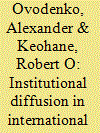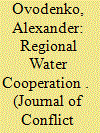| Srl | Item |
| 1 |
ID:
112803


|
|
|
|
|
| Publication |
2012.
|
| Summary/Abstract |
This article explores institutional diffusion in international environmental governance, specifying the conditions under which an existing set of institutions provides a template for new institutions. Prior institutional experiences can help to resolve bargaining problems, reduce transaction costs and provide information about likely performance. The authors discuss five examples of institutional diffusion in international environmental affairs and outline some causal mechanisms and conditions that facilitate or block the diffusion of institutional characteristics. As a baseline analysis, founded on assumptions that abstract from politics, a functional argument is developed about the conditions under which mimetic diffusion, reflecting a pattern of imitation, can occur. Although the focus in this short article is on this functional argument, the authors recognize that state interests and power, ideology, and private interests also play significant roles in facilitating or inhibiting institutional diffusion in international environmental affairs.
|
|
|
|
|
|
|
|
|
|
|
|
|
|
|
|
| 2 |
ID:
078247


|
|
|
|
|
| Publication |
2007.
|
| Summary/Abstract |
During the fall of 1950, many American national security officials concluded that the Chinese Communists would refrain from undertaking full-scale intervention in the Korean War. Contrary to most secondary accounts, however, officials who doubted that Communist China would intervene nonetheless drew increasingly worrisome signs from incoming verbal threats and intelligence signals. A small minority of officials in the State Department expressed considerable concern over the dangers of having United Nations forces cross into North Korea and approach the Yalu River. This growing concern and the minority of opposing voices, however, did not override the prevailing judgment - held by hawkish members of the State Department and the CIA as a whole - that China would more likely increase covert involvement in the Korean War, but would not undertake full-scale military intervention. Theories of biased assimilation and risk-taking practices have divergent success in predicting American reactions to the threat. Only further archival research can shed light on how this case of American strategic surprise comports with these theories
|
|
|
|
|
|
|
|
|
|
|
|
|
|
|
|
| 3 |
ID:
147697


|
|
|
|
|
| Summary/Abstract |
Shared water has prompted some neighboring countries to form integrated regional institutions and rules. Other neighboring countries have maintained less cooperative policies in managing shared water. When do governments achieve integrated management of regional water? How do they overcome barriers to integrated cooperation? This article contends that the structure of interdependence, not the number of states bordering the water, encourages different international policies. It analyzes original panel data on the agreement histories of seventy-six rivers, lakes, and seas. It also examines the role of selective incentives in promoting mutual water management. Fundamentally, the number of states with access to the water does not determine the fate of water management. Strategies for overcoming divergent preferences can be applied across situations. The key is to provide selective incentives when states are asymmetrically interdependent in using the water, to alter national preferences. Selective incentives are particularly important when few states share the water.
|
|
|
|
|
|
|
|
|
|
|
|
|
|
|
|
| 4 |
ID:
102369


|
|
|
|
|
| Publication |
2011.
|
| Summary/Abstract |
As the January 1968 Tet holiday approached, CIA analysts and American commanders in South Vietnam developed more accurate conclusions about communist military strategy than did intelligence analysts at CIA headquarters. Besides valuing different types of intelligence, General William Westmoreland, Lieutenant General Frederick Weyand, and CIA analysts in Saigon also placed greater emphasis on new information about communist military strategy than did CIA analysts at Langley. These different reactions to information highlight reasons why military commanders and intelligence analysts stationed in the theater of operations might develop more accurate conclusions about enemy military strategy than intelligence analysts stationed at their national headquarters.
|
|
|
|
|
|
|
|
|
|
|
|
|
|
|
|